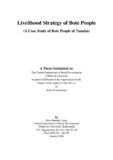Please use this identifier to cite or link to this item:
https://elibrary.tucl.edu.np/handle/123456789/2304| Title: | Livelihood Strategy of Bote People |
| Other Titles: | A Case Study of Bote People of Tanahu |
| Authors: | Lama, Mim Bahadur |
| Keywords: | Livelihood;Cultural Life;socio- economic |
| Issue Date: | Jan-2016 |
| Publisher: | Central Department of Rural Development Tribhuvan University, Kathmandu |
| Abstract: | This is the thesis report mainly focus for academic purpose, the topic entitled as “Livelihood Strategies of Bote People of Tanahu” includes the general objective of the study, specially finds out is aimed to answer the following: To explore traditional livelihood strategies of Bote and socio-cultural life of Bote People. To examine present adaptation strategies to cope with new situation developed by various environmental, socio-cultural and political factors. To analyze the impact of infrastructure development and modernization among the indigenous Bote people of study area; This study focused to study the livelihood strategy of Bote community (one of the ethnic and marginal indigenous nationality) of the Nepal .The study intends to collect the information regarding the livelihood of Bote of Tanahun, who are scattered in different village and ward of Tanahu Districts, the collected primary and secondary data have been analyzed to produce the study report. The livelihood strategy of Bote community in the study area is in transition, it shifted from agriculture to non agricultural one .The household assets of this community have greatly influenced the process of adaptation of new strategies of modification of traditional occupation .Economic development and other economic activities changes the surrounding and environments of the peoples of particular areas have changes their way of life to adopt with the chcnging environment .The objective of the research is to study and identify the cause and effect due to the changing livelihoods of Bote people in their socio-economic ,socio –cultural and society . Considering the importance of the study , information and documentations ,this study focused on Botes in rural people .The research has been limited to only one Tanahun District and its main Byas Municipality ward number 5 and other VDCs, where most of Botes are resides. The study aims to evaluate and explore the socio economic impact due to the livelihood strategy of Bote community of rural society in Tanahun District. The Botes living in Tanahun District ,traditionally fishing and boating were selected for the information and analysis .The total population of Bote Community is 7969(.04%) of the countrys population,who lived and scattered in more than 68 districtits .Major settlement is in sarlahi,Dang ,Chitawan ,Palpa,Gulmi,Nawalparasi and Tanahu District(CBS 2011) in which 34.90 % Botes are literate.They study has been fundamentally based on field survey and secondary sources of information have also been used from the relavant sources .Overall 62 households ,202 members from the municipality „s ward and VDC representatives. Social workers and other officieals have been interacted during field study. Structured ,unstructured and open ended questionnaire have been used in interview with focused group. The Bote people are traditionally ferrymen and fisher men. They are aboriginal and gold planner. Though Bote people are traditionally ferrymen and fisher men. But in the study area they are not doing their traditional occupations, but are engaged in wage labor and other work like agriculture and construction, some agricultural work, animal husbandry, production of local liquor, migrate to foreign to labor work in neighbors villages and districts .The literacy rate of Bote is gradually increasing .They do not have any idea what is the impact of the education in their socio -economic, socio -culture ,income generation and livelihoods. It has been found that the construction of highways, concrete bridges and trail bridge on the Madi river which affect on the traditional occupation (ferrymen- Boating and fishing) of Bote people in the village. Some general recommendations have been suggested as findings from the study area .There should be implemented sustainable plans, program and polices by the Nepal government ,INGOs/NGOs and private sector to uplift socio economic ,socio culture and rural development by providing training and education related to sustainable livelihood activities program. Literacy program should be carried out effectively and efficiently in the Botes community to improve their socio economic ,socio cultural status of Bote people .And their cultural preservations as well as cultural awareness program must be lunched for this community .Their traditional technique of gold panning should be protected and modernized by using modern technology Income generation activities should be implemented by the government in local level through entrepreneurship development, vocational trainings and others. |
| URI: | http://elibrary.tucl.edu.np/handle/123456789/2304 |
| Appears in Collections: | Rural Development |
Items in DSpace are protected by copyright, with all rights reserved, unless otherwise indicated.

